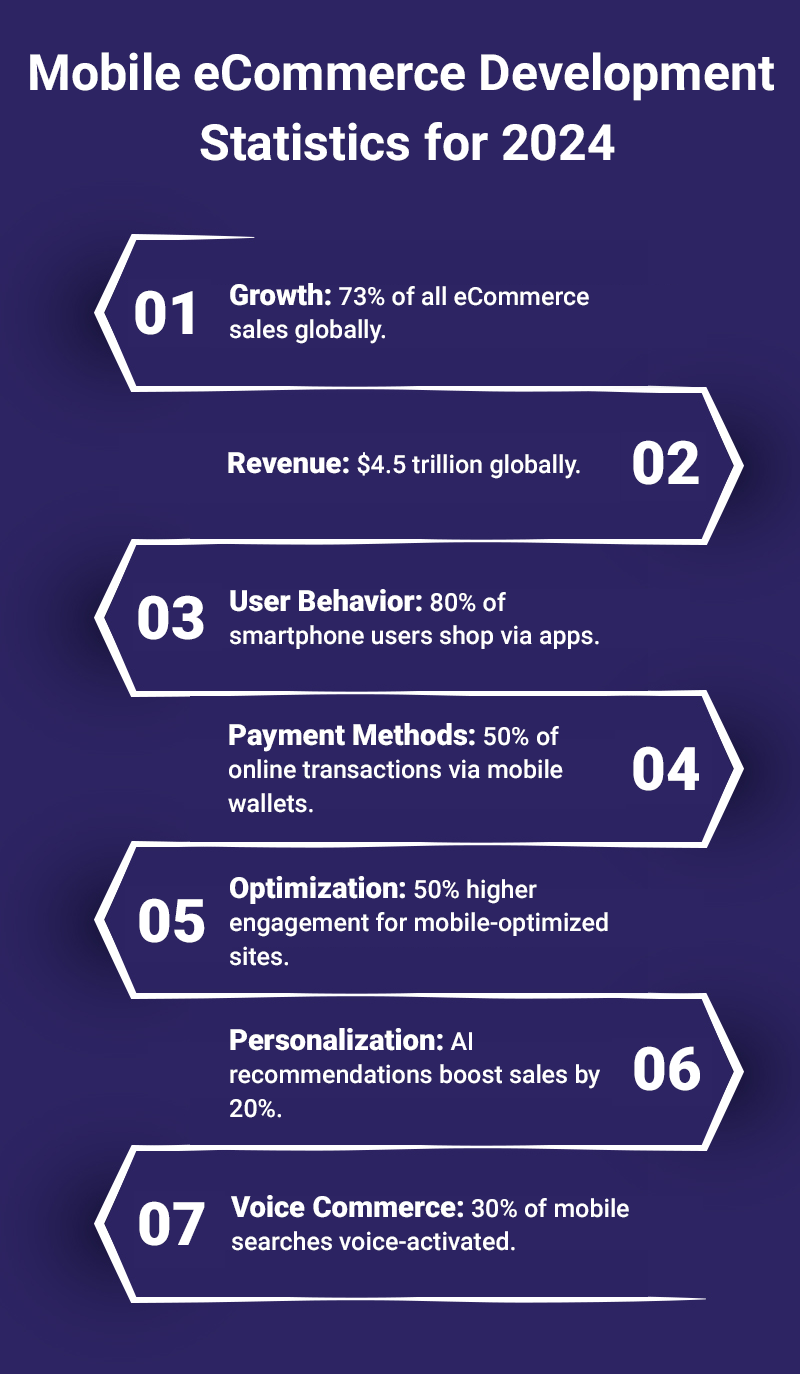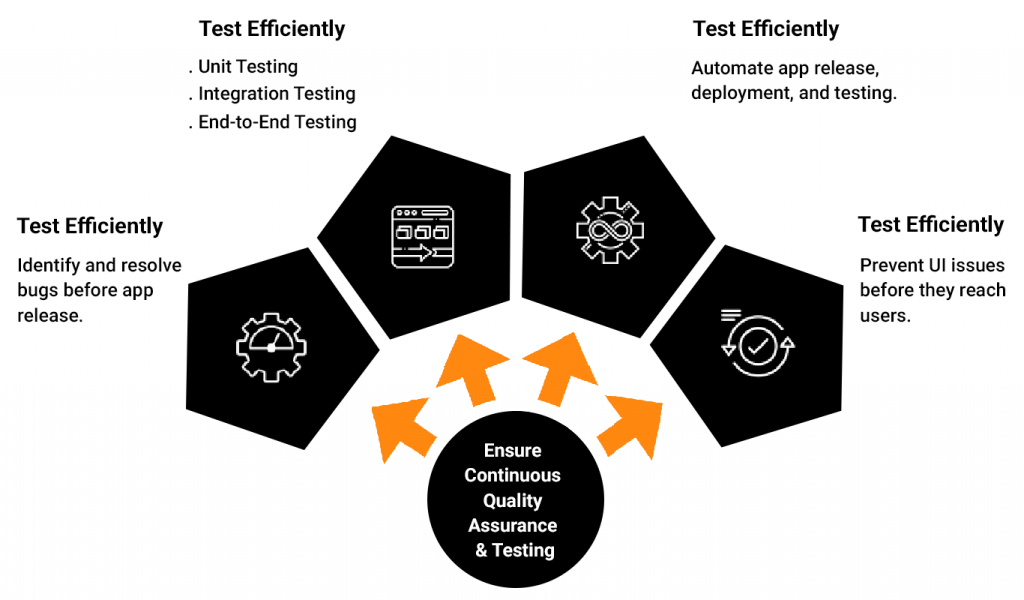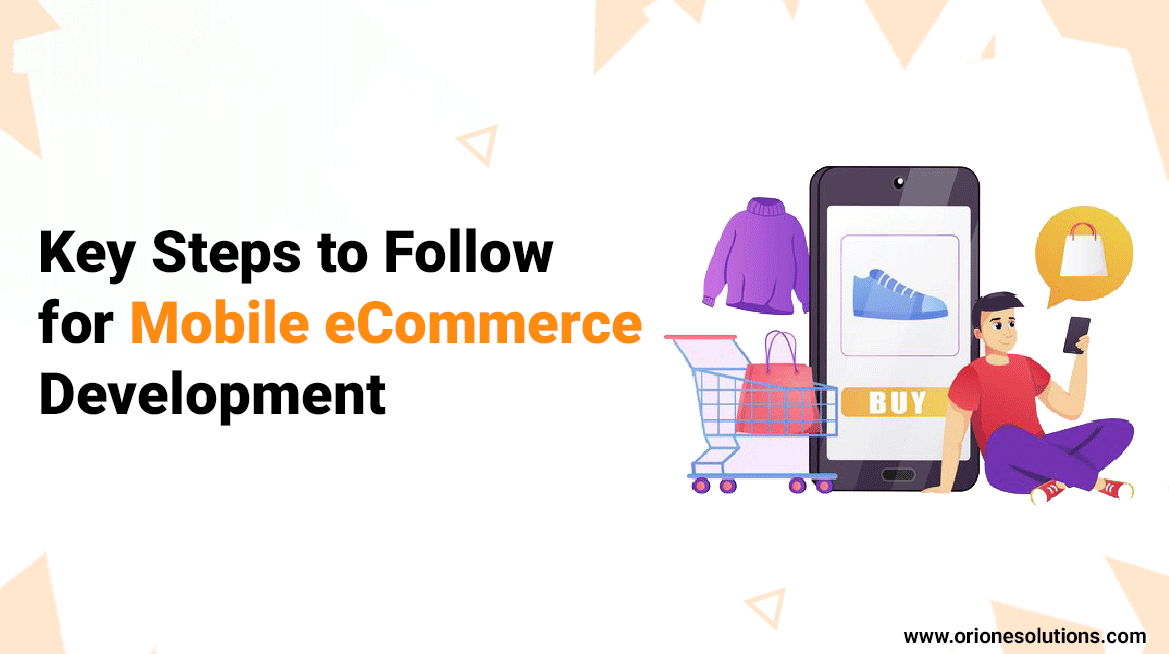The growing digitization has taken the world to new heights with internet penetration and internet usage a norm. This has further made mobile eCommerce development a necessity not a mere trend. After all, having mobile apps for businesses helps build a strong online presence, ultimately increasing sales and overall growth.
However, eCommerce app development for mobile devices is not an easy task. It takes the adoption of the right tools and practices along with seeking assistance from a reputable mobile app development company to develop an app that meets the business need and delivers the best user experience.
According to a study by Capital One Shopping, mobile eCommerce sales are expected to reach $7.08 trillion by the year 2027. All this showcases the growing competition and growth opportunities in the mobile eCommerce market and the need for businesses to develop an eCommerce app to ensure customer satisfaction. Though the opportunities are vast, there are still some steps to be followed to capture the audience’s attention and boost sales.

So, let’s dive deep into this blog to learn the process for successful mobile eCommerce development.
8 Steps to Follow for Successful Mobile eCommerce Development
The core building blocks and components of eCommerce app development help provide a fully functional and user-friendly shopping experience to the customers. It lets customers browse products efficiently, checkout securely, and handle orders hassle-free.
So, let us explore these key steps you must consider for efficient integration of these components and delivery of innovative mobile apps.
Execute Market Research and Identify Target Audience
Before you dive into the development process, you need to first define the project goals and assess your target audience. It is vital to make the right decisions throughout the process and ensure the developed solutions align with the requirements of business and end-users.
In addition, execute thorough market research to evaluate the current trends, competitor offerings, and customer choices. This will help you identify USPs and assess the right feature set that can make your app unique from others and help attract a huge customer base.
Integrate Essential Functionalities into the App
Now that you have understood the user’s feedback, market trends, and where your competitors stand, it is time to fulfill the app requirements. Developing a successful eCommerce application and enhancing the shopping experience of the users requires the integration of several key features.
These features involve search functionality, hassle-free navigation, integration of secure payment gateways, and social sharing buttons. All these functionalities incorporated into your mobile application will enable your app to stand out from the competitors while delivering a simplified shopping experience to the customers.
Pick the Right Technology and Platform
Choosing the right tech stack is essential to build an innovative and robust eCommerce application. For example, when building an eCommerce app for Android, look for leveraging technologies such as Java, Kotlin, or more. Similarly, it goes to choosing the ideal technology for building iOS applications.
If you want to build a cross-platform mobile app, the list of programming tools includes Flutter, React Native, and Xamarin.
Having such information prior to development makes it hassle-free to decide on the ideal platform that most of the target audience prefers and choose a similar platform for your custom app development.
Build a Minimum Viable Product
A minimum viable product is the beginning version of an app development equipped with the primary features required for smooth app functioning. This development approach is highly beneficial for app testing on a trial basis. It minimizes the time and money invested in the long app development process.
Furthermore, you can gather user feedback upon the MVP release. It helps to know the customer satisfaction level and missing features that can result in developing a full-fledged eCommerce app for mobile devices.
Gather Feedback
When the minimum viable product is introduced, the next thing comes to collecting customer feedback. It is an important process of understanding the customer interaction with the app, capturing their experience, and understanding the possibilities of enhancements.
Simply put, know the preferences of your target audience and align the functionalities of the application accordingly for an enhanced experience.
Prioritize Security
Your eCommerce app security and data privacy are vital, especially if your application uses users’ sensitive information and deals with a financial transaction. Neglecting privacy and security can lead to data breaches and lower customer trust in your mobile app.
Here, you can follow some techniques to build customer’s trust in your mobile application.
- Use the best authorization procedures and encryption algorithms for capturing and sending user data over networks.
- Adhere to industry best practices for data security, including data encryption, two-step verification, and more, when storing data locally and in databases.
Ensure Continuous Quality Assurance & Testing
Mobile application testing is a vital practice to be followed to identify and resolve the bugs before the app is introduced to the users.

When you test the apps efficiently, it ensures there’s no room for errors and delivers a positive end-user experience.
- Implement techniques such as unit testing, integration, and end-to-end testing.
- Incorporate a CICD pipeline to automate the processes like app release, deployment, and testing.
- Use automated UI testing to eliminate UI issues beforehand.
Regular Maintenance and Upgrades
Mobile application OS gets updated frequently with new features, supporting these features and providing compatibility helps businesses keep users happy.
It is essential to keep the app updated as per the mobile shopping trends for better customer engagement. Updating the mobile app with new features and functionalities increases customer satisfaction.
- Fix errors and bugs and provide ongoing maintenance of the mobile application.
- Provide support via live chatbots or other channels to ensure 24/7 assistance.
Wrapping Up
Modern customers are reliant on mobile eCommerce apps due to their convenience. In addition, it benefits businesses by enabling them to enhance customer engagement and generate increased revenue. Therefore, many businesses are considering the development of user-friendly eCommerce apps for their mobile audience. However, it is important to understand that following the right development process is the key to successful project completion.
Fortunately, several eCommerce app development companies facilitate building and maintaining user-friendly mobile apps for your business. One such company is Orion eSolutions which specializes in helping businesses deliver high-quality products. Get in touch with our mobile app development professionals and leverage their technical proficiency to get innovative and intuitive apps that cater to businesses’ unique needs.
Frequently Asked Questions
1. What are the benefits of building mobile eCommerce applications?
Answer: eCommerce mobile app development provides numerous advantages that include:
- Enhanced customer convenience and experience
- Personalized shopping experiences
- Increased market reach and clientele
- Expanded brand’s online visibility
2. How much does it cost to hire mobile app developers for application development?
Answer: The cost of hiring mobile app developers differs depending on numerous factors. It includes the level of expertise and years of experience an individual possesses, what are their skill sets, and their location. In addition, the mobile app complexity and knowledge of the tech stack required impact the overall cost of hiring the professionals.
3. What are the essential key features of an eCommerce mobile app?
Answer: A few vital components of any responsive and intuitive mobile eCommerce app include user-friendly navigation, product categories, seamless product search, and secure payment methods. In addition, a simplified checkout process and push notifications are essential for successful mobile app development.









